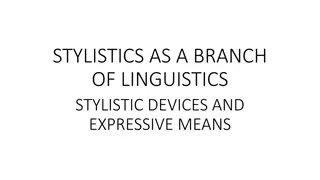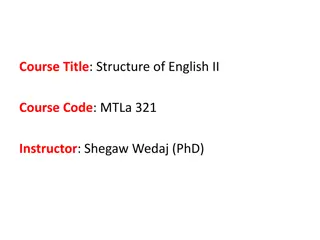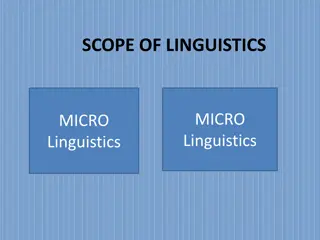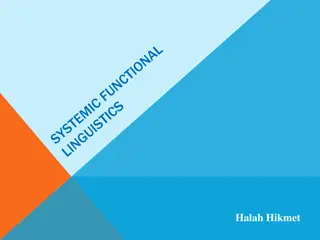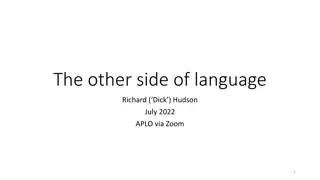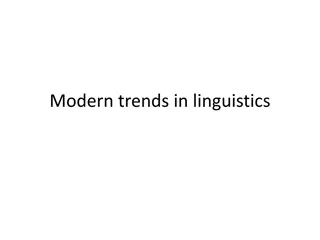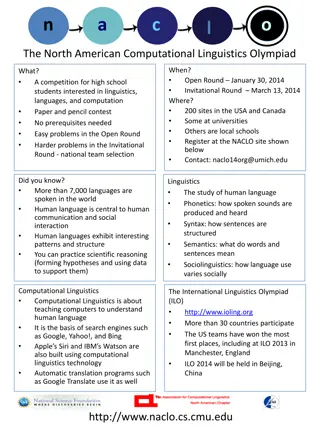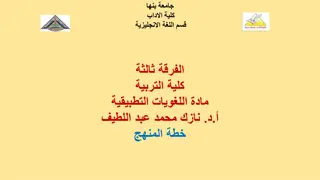
Understanding Human Language: Key Characteristics and Significance
Explore the profound role of language in defining humanity, how it shapes cultural behavior, and its unique characteristics such as being sound-based, systematic, and meaningful. Discover how language enables communication and interpretation of human experiences across various disciplines like anthropology, sociology, literature, and philosophy.
Uploaded on | 2 Views
Download Presentation

Please find below an Image/Link to download the presentation.
The content on the website is provided AS IS for your information and personal use only. It may not be sold, licensed, or shared on other websites without obtaining consent from the author. If you encounter any issues during the download, it is possible that the publisher has removed the file from their server.
You are allowed to download the files provided on this website for personal or commercial use, subject to the condition that they are used lawfully. All files are the property of their respective owners.
The content on the website is provided AS IS for your information and personal use only. It may not be sold, licensed, or shared on other websites without obtaining consent from the author.
E N D
Presentation Transcript
1-Language Perhaps the single greatest ability of humankind is the ability to use language. We are human because we have language, and we have language because we are human. Language is the key that opens the door and allows us to look for into the minds of others, to share what they have learned and to feel what they have felt. According to philosophy, language is the source of human life and power. To some people of Africa, a newborn child is a "thing" not yet a "person" only by the act of learning language does the child become a human being thus language can be defined from different point of views.
According to anthropology, anthropologists regard language as a form of cultural behavior. In the light of sociology, sociologists define language as an interaction between members of a social group. While students of literature view language as n artistic medium. Philosophers think that language is a means of interpreting human experience. Finally, teachers say that language is a set of skills.
-Some Characteristics of Human Language: 1. Language is sound 2. Language is systematic 3. Language is a system of systems 4. Language is meaningful 5. Language is linear 6. Language is arbitrary 7. Language is conventional 8. Language is a system of contrasts 9. Language is unique 10. Displacement Productivity / creativity transmission 11. 12. Cultural 13. Discreteness 14. Duality
1-1 Some Characteristics of Human Language There is a number of properties which differentiate human language from all other forms of signaling and which make it a unique type of communication system: 1-Language is sound: Language is basically oral, since the most common experience most human have of language is in speaking and listening to it. This statement also implies that the sounds of a language have primacy over their representation in writing. While the writing systems of languages have their systematic aspects. The linguist considers writing and other methods of representing language soundly to the basic phenomenon of speech.
2-Language is systematic: All human languages are systematic, and each language has its own system. There must be a system to organize whatever language or dialect. It is describable in terms of a finite number of units that can combine only in a limited number of ways. It refers to the number of permissible combinations i.e. whatever the number of symbols not all the number of possible combination of sounds or grammatical units will occur e.g. the word order SVO is a permissible order in English, but not in Arabic where the order VSO is permissible. Moreover, with words "table" and "stable", it is possible to add to each a suffix (-s) to give "tables" and "stables", but we can't add a prefix to "stable" that would give recognizable sequence in English., nor can we add another suffix to each. On phonological level, X /st-/ is a possible combination in English, for example street while /sz-/is not.
3- Language is a system of systems: Languages grammatical system, each with its proper units and rules of permissible combination and order. Units are not permitted to combine for several reasons: phonological, grammatical, Language is a system of systems all of which operate simultaneously, but we can distinguish, for the sake of analysis, the units and combination rules proper to each. For example, there is no such word as "gstable" in English: also, there is no grammatical rule by which we can add another suffix to "tables". have both a phonological and a stylistic, semantic.
4- Language is meaningful: The sounds produced in speech are connected with almost every fact of human life and communication. There is, in fact, a relationship between the kinds of sounds speakers of various languages make and their environment. It is through the learning of language that a child becomes an active member of the community. Moreover, the leaders in a society preserve and advance their leadership through their ability to communicate with people via the use of language.
5-Language is linear: A fundamental feature of a spoken language is that it is linear, since the sounds of language are produced by successive movements of the speech organs. Speech is linear in terms of time. We can represent language by using separate symbols for each sound and arranging the symbols in a linear succession that parallels the order in which the sounds are produced. For example, in spoken language linearity is realized in terms of time. Consequently, when we say "cup", for instance, first we pronounce /k/ then / / and finally /p/, one follows the order. In writing, linearity is realized in terms of space or distance, i.e. in writing "cup" we start from left to right, writing one letter after the other.

